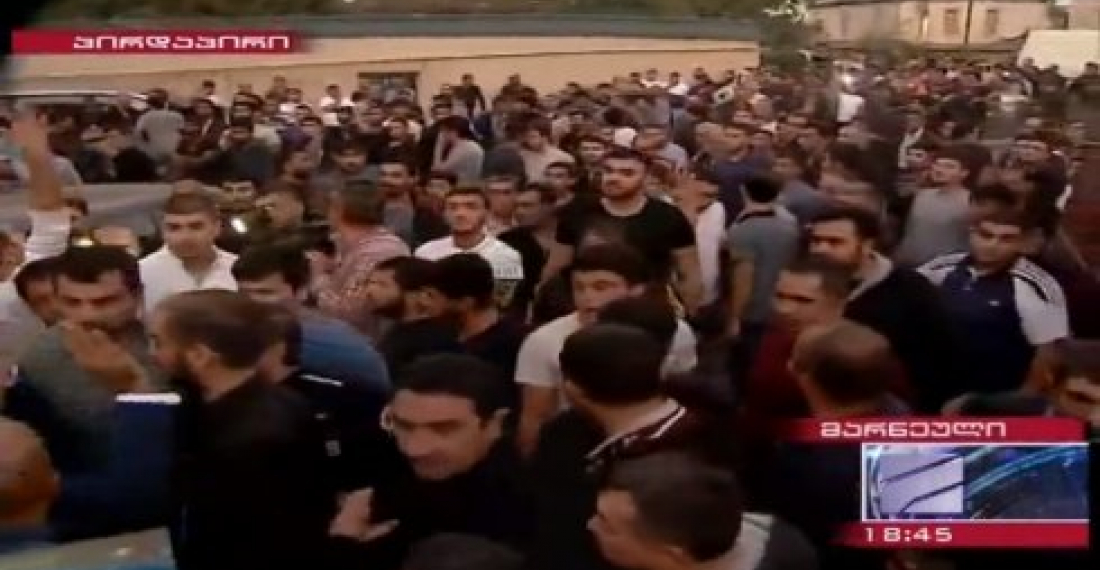This is a commentary prepared by the editorial team of commonspace.eu
For Georgia, the night of 8 to 9 October can be described as the return of the ghosts of the past, threatening to derail the country's significant, but still fragile, achievements in the process of democratic state-building.
Georgia held parliamentary elections on 8 October. They were highly competitive with a large number of parties and candidates offering a wide spectrum of choice. They were well prepared by a properly resourced and efficient election administration, and they were closely monitored by more than 80,000 local and international observers, party representatives and journalists. The campaign had gone on for three months, and was largely peaceful, if lacklustre. Georgia has a vibrant media and NGO scene, which makes it unique in the post-Soviet space.
The election therefore should have been a smooth exercise. Initially it looked as if this was going to be the case. In the vast majorities of localities, polling day was calm. A few incidents, and some serious flaws at the local operational level of the election administration process, marred the picture. As polling was about to close, an ugly incident took place in the mainly Azerbaijani speaking region of Marneuli. Local supporters of the opposition United National Movement (UNM) alleged election irregularities, attacked the polling station and attempted to remove the ballot box. In the ensuing fracas, the head of the local police was seriously injured. The situation spiralled very quickly into a stand-off between government and protestors. In Georgia, a country with fresh memories and ever-present realities of inter-ethnic conflict, any suggestion of a return to ethnic politics is rightly seen as highly dangerous and fraught with risks.
To their credit, Georgian law enforcement officers on this occasion were patient and measured. They stabilised the situation without having to resort to force. In the meantime, however, similar incidents were erupting elsewhere in the country. In Kutaisi a UNM MP was harassed, and in Zugdidi, a polling station attacked mid-count by supporters of the governing Georgian Dream (GD) party. Though there is no reason to suggest any connection between the incidents, other than the outpourings of feeling by local hotheads, such events tarnish Georgia's international reputation.
That did not, however, stop certain opposition groups from weaving the incidents into a larger political narrative. The UNM and some of its satellite parties begun crying foul and accusing the government of stealing the election. The UNM called on its supporters to gather near at the Central Elections Commission (CEC), the authority that oversees Georgian elections, to protest their alleged mishandling of the vote. Some UNM members even spoke of a scenario where they could force the cancellation of the election through street action, scenario that worked well for them in 2003, but which is absolutely out of place in today's conditions. Such an approach was, and is, unjustified.
As results from the election started coming in it was clear that the UNM had lost decisively. The results tally with a parallel voter tabulation (PVT) conducted by a respected local NGO, the International Society for Free Elections and Democracy (ISFED), and there is no reason to believe that it is anything but a true reflection of the wishes of the Georgian people.
The UNM now needs to accept the election result and move on. Only as such will its credibility survive intact to fight another day.
The UNM is a tightly disciplined and well organised force. It retains, however, a set of competing internal factions. The most important factional fault line is between those who still see the future as being with exiled ex-president Mikheil Saakashvili and those who want to move on. By retaining his informal leadership of the UNM from afar, Saakashvili is holding the party back. Rather than bolstering its electoral prospects, he has become an albatross around the UNM's collective neck. From far away Odessa where he is governor, and in the anomalous position of being a citizen of a foreign country, Ukraine, Saakashvili is no longer the alternative that Georgia wants and needs, and he may not even understand the local dynamics anymore. Some of the statements he made in recent weeks were, to say the least, odd.
The election has given a clear result and it must now be respected. That does not mean that there is not much to be learnt, and even much more to be done if the nightmare of the 8-9 October is not to be relived after future contests. Here the onus rests on the Georgian government, and the victorious incumbent party, Georgian Dream. That party is a broad church but that is no excuse for not exercising more control and discipline on its supporters. The party needs to be magnanimous in victory, not least because its resounding victory conceals two other significant realities. Firstly, that nearly half the electorate did not bother to turn out to vote at all (turnout was 51%); second, of those who voted around 25% voted from parties apart from GD and UNM that will be mostly unrepresented in parliament.
A process of political renewal is now necessary in Georgia. This will take time and will not be easy. Yet if Georgia is really to set a European course, then the last few days have shown that it still lacks the political culture necessary for it to do so. Developing that culture must be a priority.
Elections are about the peaceful transfer of power through the ballot box. It happened in 2012. It has not happened in 2016 because the Georgian people did not want it, but if Georgia is to be a democracy it needs to happen again in the future. No party has a right to power, and government and opposition alike would do well to remember that.
This is a commentary prepared by the editorial team of commonspace.eu.







